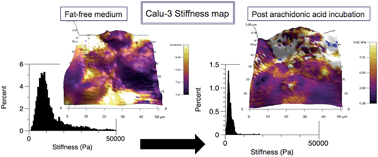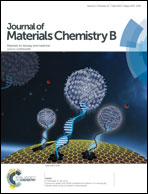A ‘soft spot’ for drug transport: modulation of cell stiffness using fatty acids and its impact on drug transport in lung model
Abstract
The impact of a polyunsaturated fatty acid, arachidonic acid (AA), on membrane fluidity of epithelial cells and subsequent modulation of the drug transport was investigated. Membrane fluidity was assessed using molecular force microscopy. Calu-3 human bronchial epithelial cells were cultured on Transwell® inserts and the cell stiffness was assessed in the absence of fatty acids or in the presence of 30 μM AA. The morphology of the epithelial cells was distinctly different when AA was present, with the cell monolayer becoming more uniform. Furthermore the cell stiffness and variation in stiffness was lower in the presence of AA. In the fat-free medium, the median cell stiffness was 9.1 kPa which dropped to 2.1 kPa following exposure to AA. To further study this, transport of a common β2-agonist, salbutamol sulphate (SS) was measured in the presence of AA and in a fat free medium. The transport of SS was significantly higher when AA was present (0.61 ± 0.09 μg versus 0.11 ± 0.003 μg with and without AA respectively). It was evidenced that AA play a vital role in cell membrane fluidity and drug transport. This finding highlights the significance of the dietary fatty acids in transport and consequentially effectiveness of medications used to treat pulmonary diseases such as asthma.


 Please wait while we load your content...
Please wait while we load your content...